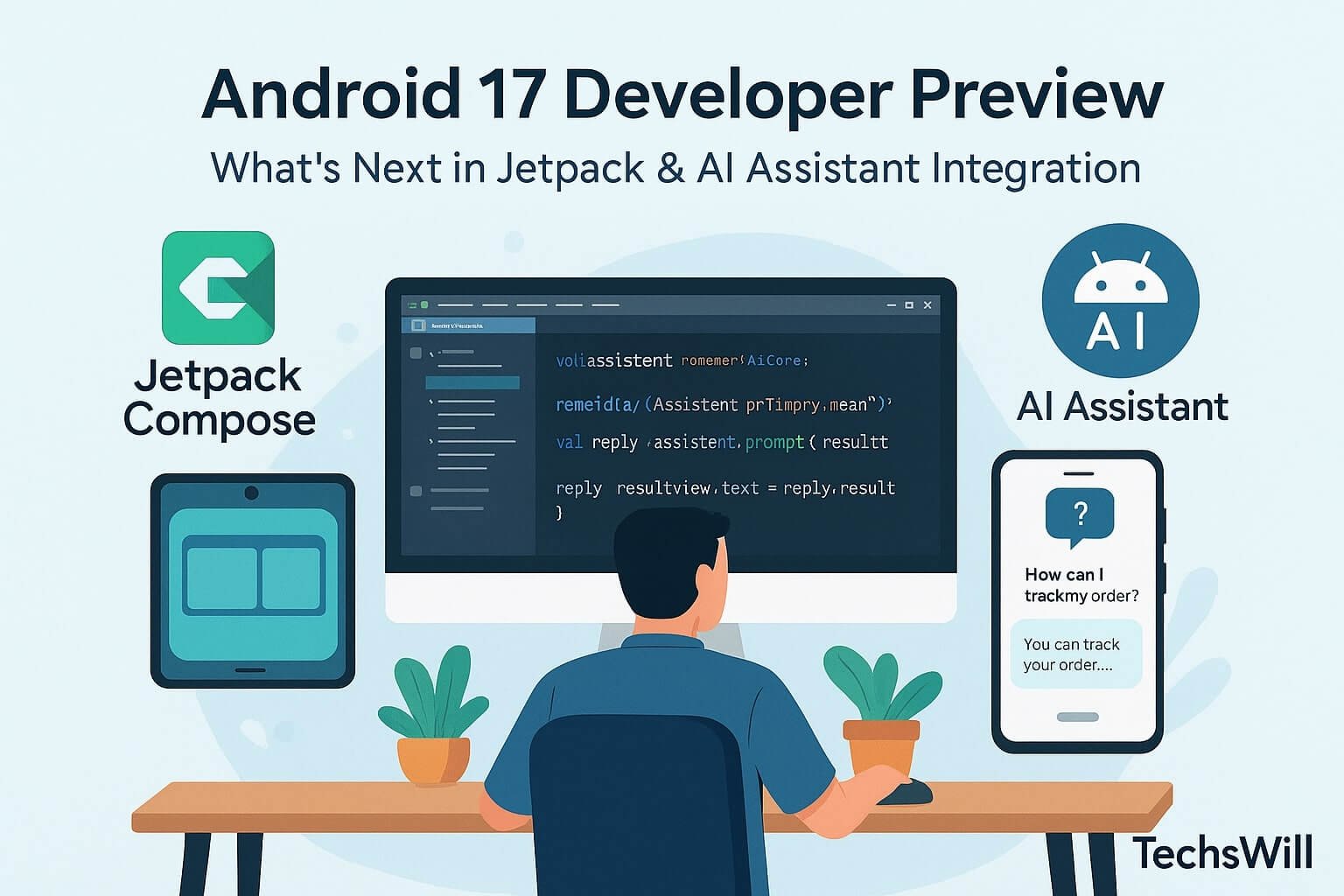Android 17 is shaping up to be one of the most developer-centric Android releases in recent memory. Google has doubled down on Jetpack Compose enhancements, large-screen support, and first-party AI integration via the new AICore SDK. The 2025 developer preview gives us deep insight into what the future holds for context-aware, on-device, privacy-first Android experiences.
This comprehensive post explores the new developer features, Kotlin code samples, Jetpack UI practices, on-device AI security, and use cases for every class of Android device — from phones to foldables to tablets and embedded displays.
🔧 Jetpack Compose 1.7: Foundation of Modern Android UI
Compose continues to evolve, and Android 17 includes the long-awaited Compose 1.7 update. It delivers smoother animations, better modularization, and even tighter Gradle integration.
Key Jetpack 1.7 Features
- AnimatedVisibility 2.0: Includes fine-grained lifecycle callbacks and composable-driven delays
- AdaptivePaneLayout: Multi-pane support with drag handles, perfect for dual-screen or foldables
- LazyStaggeredGrid: New API for Pinterest-style masonry layouts
- Previews-as-Tests: Now you can promote preview configurations directly to instrumented UI tests
Foldable App Sample
@Composable
fun TwoPaneUI() {
AdaptivePaneLayout {
pane(0) { ListView() }
pane(1) { DetailView() }
}
}
The foldable-first APIs allow layout hints based on screen posture (flat, hinge, tabletop), letting developers create fluid experiences across form factors.
🧠 AICore SDK: Android’s On-Device Assistant Platform
The biggest highlight of Android 17 is the introduction of AICore, Google’s new on-device assistant framework. AICore allows developers to embed personalized AI assistants directly into their apps — with no server dependency, no user login required, and full integration with app state.
AICore Capabilities
- Prompt-based AI suggestions
- Context-aware call-to-actions
- Knowledge retention within app session
- Fallback to local LLMs for longer queries
Integrating AICore in Kotlin
val assistant = rememberAICore()
val reply = assistant.prompt("What does this error mean?")
LaunchedEffect(reply) {
resultView.text = reply.result
}
Apps can register their own knowledge domains, feed real-time app state into AICore context, and bind UI intents to assistant actions. This enables smarter onboarding, form validation, user education, and troubleshooting.
🛠️ MLKit + Jetpack Compose + Android Studio Vulcan
Google has fully integrated MLKit into Jetpack Compose for Android 17. Developers can now use drag-and-drop machine learning widgets in Jetpack Preview Mode.
MLKit Widgets Now Available:
- BarcodeScannerBox
- PoseOverlay (for fitness & yoga apps)
- TextRecognitionArea
- Facial Landmark Overlay
Android Studio Vulcan Canary 2 adds an AICore debugger, foldable emulator, and trace-based Compose previewing — allowing you to see recomposition latency, AI task latency, and UI bindings in real time.
🔐 Privacy and Local Execution
All assistant tasks in Android 17 run locally by default using the Tensor APIs and Android Runtime (ART) sandboxed extensions. Google guarantees:
- No persistent logs are saved after prompt completion
- No network dependency for basic suggestion/command functions
- Explicit permission prompts for calendar, location, microphone use
This new model dramatically reduces battery usage, speeds up AI response times, and brings offline support for real-world scenarios (e.g., travel, remote regions).
📱 Real-World Developer Use Cases
For Productivity Apps:
- Generate smart templates for tasks and events
- Auto-suggest project summaries
- Use MLKit OCR to recognize handwritten notes
For eCommerce Apps:
- Offer FAQ-style prompts based on the product screen
- Generate product descriptions using AICore + session metadata
- Compose thank-you emails and support messages in-app
For Fitness and Health Apps:
- Pose analysis with PoseOverlay
- Voice-based assistant: “What’s my next workout?”
- Auto-track activity goals with notification summaries
🧪 Testing, Metrics & DevOps
AICore APIs include built-in telemetry support. Developers can:
- Log assistant usage frequency (anonymized)
- See latency heatmaps per prompt category
- View prompt failure reasons (token limit, no match, etc.)
Everything integrates into Firebase DebugView and Logcat. AICore also works with Espresso test runners and Jetpack Compose UI tests.
✅ Final Thoughts
Android 17 is more than just an update — it’s a statement. Google is telling developers: “Compose is your future. AI is your core.” If you’re building user-facing apps in 2025 and beyond, Android 17’s AICore, MLKit widgets, and foldable-ready Compose layouts should be the foundation of your design system.
🔗 Further Reading
- Android 17 Developer Preview
- Jetpack Compose Official Docs
- AICore SDK Guide
- Android Studio Vulcan Preview

